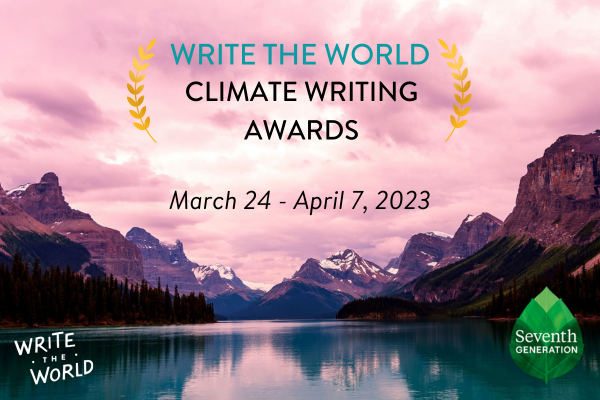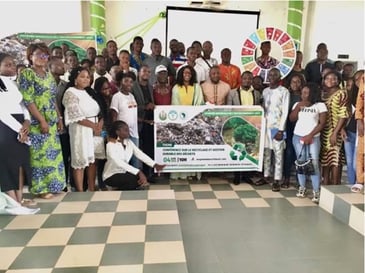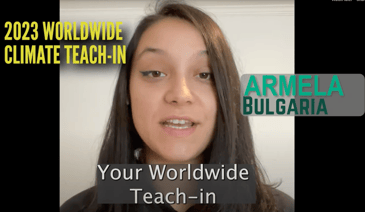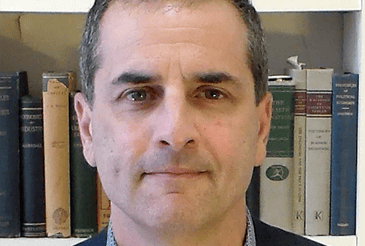Teens from 33 Nations Wrote about the Climate Crisis for Write the World’s Teach-in

Liza Cochran, Senior Program Manager, Write the World, Inc. (Cambridge, MA, USA)
Try spending a week in a tent with rising water at your feet
Maybe you’ll find it simpler to make your decisions
When you have to rely on UNICEF to get something to eat
That’s the penultimate stanza of Rohana’s poem, “Greenwashing and Greenbacks.” The 17-year-old from Pakistan depicts the international community’s “meager” commitments to address climate change following last year’s devastating floods that submerged half her country.
Rohana’s poem was chosen as a finalist for Write the World’s Climate Writing Awards—an opportunity for teens to explore the climate crisis in three genres: poetry, flash fiction, and advocacy letters. With the backing of Seventh Generation, the inaugural Awards grew out of a collaboration with the Worldwide Teach-in on Climate and Justice and a shared vision to give young people the opportunity to write about climate, and educators the tools to support this writing in their classrooms.
“I wanted to make [the reader] picture the split between conference halls and tents,” Rohana said about the intention behind her poem. “Every year we see countless delegates and ministers and diplomats and ambassadors and envoys and representatives gather and confer for what seem to be, in essence, endless business lunches. This disconnect between these comfortable, relaxed conventions and the affected places is what I wanted to draw attention to… to make you wonder: What is there to deliberate about?”
Global Teach-in, Global Voices
Write the World, Inc., a nonprofit dedicated to elevating the voices of young people around the globe, joined tens of thousands of students and educators around the world as a part of the Worldwide Teach-in. Submissions poured in from 33 countries—poems, stories, and a raft of letters to world leaders. From Zambia to Australia, Nigeria to Japan, Malaysia to the UK, the entries brimmed with the piercing insights of young people contending with a threat that is already bearing down on their sense of possibility, and one that will most certainly define their futures.
Take this winning piece, by 15-year-old Jane from Central Texas. Her 500-word flash fiction entry, “Swamped,” starts with this opening scene:
It is mid-December in Washington D.C., and the algae slurping against the sides of my boat is steaming in the sun.
I, Andromeda Hisakawa, wipe sweat from my face and lean over the edge of my splintery dinghy, plunging my hands into the water, only to emerge again, clutching a bronze plaque, emblazoned with the words:
Lt. Snowy Johnson — 1989 - 2013 CE: he dreamt of a better future
It's a gravemarker.
I tuck my hair behind my ears with tanned fingers, studying it.
2013, Common Era.
Common Era, as in before the Melt.
As in, before the Floods.
Before coastlines drowned.
Before the world changed forever.
I sigh, chucking the plaque into the bottom of my boat with the rest of my finds, and grip my boat paddles as I push away through the shallow water.
I’m a MudSifter. This is my job: unearthing relics of the past to smelt down and make into a worthy future.
The piece reads like a bestselling sci-fi novel. Yet, as Jane explains, her writing was not speculation. The concept for the story was born out of real but seemingly preposterous efforts to mitigate a warming world—UV-blocking solar shields:
This idea struck me as being so drastic and unbelievable—people are considering building giant space sunglasses for Earth? What! But hearing that got me thinking—how bad would things have to get before humankind would be forced to take such measures? What would life be like, living in a future like that? I wanted to combine the issues of today—pollution, sea level rise, extreme weather, energy crisis, dwindling resources—with some of the proposed plans against climate change.
Intensive research followed, as Jane immersed herself in the science behind a changing climate, and the technology that could propel mitigation efforts:
I was constantly asking myself questions and looking up resources, like sea-level rise maps and science articles. I wanted to make my world seem as realistic as possible, and I had to think about how elements of the world would work together. If machines are solar powered, how do they work when sunlight is reduced? How will cities be protected from destructive storms? If vast areas of shoreline are flooded, where will people get new resources?
Although climate change offers fiction writers like Jane a built-in, page-turning plot, the intention behind “Flooded” was not entertainment, but a reckoning with the intensifying crises:
I hope people see how their present actions can affect the future—so many people are encouraged to ‘live in the moment’, but I believe it’s also important to zoom out of your daily life and think about the impact your deeds will leave on the world of tomorrow. Actions aren’t biodegradable. They leave marks for years to come.
Like Jane, Sasindie, a 19-year-old from Sri Lanka, hoped that her piece would lift readers out of the confines of their day-to-day lives.
In my poem I wanted to hold in front of the reader the past, present and future of our planet; our ancestors, us, and our future children. Stepping back from our day to day lives to look at the past and future of climate change can be a great way to realise the gravity of the issue. And by gaining a better perspective from this vantage point, we can come back to our daily lives which is the best place we can make the decisions to fight the climate crisis
Seeds of Agency, Connection, Hope
Write the World designed the Climate Awards with this impact on readers in mind—from other teens in the Write the World community, to educators taking part in the Teach-in, to world leaders in need of a dose of reality from the ground. But the Awards were also intended to engage young people in a writing process that would change the way they related to the crisis, deepening their understanding of the subject, while finding within themselves the seeds of agency, connection, and hope.
Throughout our ten years of engaging teens in writing about global issues, Write the World has found that inviting writing about climate change has the power to endow young people with a sense of possibility, fostering the twin imperatives of action and hope. Perhaps most importantly, as young people the world over read and comment on one another’s drafts, the exchange of perspectives nurtures connection and compassion across continents, a sense of uniting over a common cause.
15-year-old Isabelle, from Hong Kong, described the experience of a global audience this way:
It felt—and still feels—incredibly rewarding to share this piece with the greater community. I hope that the moments of narration in my work can act as a seam of palpable relation between climate change and humankind, between a storyteller and an audience who perhaps come from diverse experiences and harbor different beliefs.
Isabelle’s flash fiction entry “Memory of Water'' depicted a family in the aftermath of a climate-induced tragedy. She said that the experience of putting herself in the shoes of her characters ignited within her a motivation to do more:
I found that writing, as a form of art, delivers an individual, humanizing lens to the climate crisis—a topic that often seems terribly distant, lacking ties to our own lives. Writing this piece prodded me to truly look deep within myself: what was I doing to tackle this issue? What could I be doing?
Sasindie, too, found that writing poetry engaged her in the topic in a new way. “The biggest impact that the writing process had on me is that it helped me realise how important poetry is to activism,” she reflected. It was by accessing her deepest sense of loss in the face of the climate crisis that Sasindie was able to free herself from what she calls the “safe poems” she used to write, and find a voice in herself both “bold and brave.”
Dismantling Walls of Numbness
“We need artists, writers, poets, and filmmakers: they can dismantle the walls of numbness,” wrote climate scientist Joëlle Gergis, a lead author of 2022’s IPCC Report, in her recent book Humanity's Moment.
Indeed, reading these personal accounts from young people about climate’s toll, it is impossible to look away when their grief, outrage, and courage is laid before us so starkly.
Sasindie’s poem, “To the daughter I may never have”, reckons with what it could mean to bring children into a warming world:
I fear you'll search for the stars to find
only darkness staring back at you.
Tell me, how can I watch you stand
with your eyes wide open
and still not see the light?
the sea will drown my island, the smoke will cloud
my sky, but the greatest loss would be losing you
before you've ever known the stars.
“This was ‘the poem’,” Sasindie explained afterwards, “that taught me the power that poetry has to inspire action and spark change. Poetry can capture an audience and convey a truth in a way that touches the reader right at the heart, and I believe that is of utmost importance when you’re fighting for change.”
Along with the hundreds of other writers who rallied around this call to engage with the climate crisis through poetry, fiction, and advocacy letters, Sasindie’s words remind us—educators around the globe—of the power that comes from turning toward this crisis in our classrooms, rather than away. Meaningful action starts with inviting students to pick up the pen.
You can read a selection of winning pieces and finalists here.
Are you an educator interested in joining Write the World’s community of teachers and students? Please email Liza at Liza@writetheworld.org



